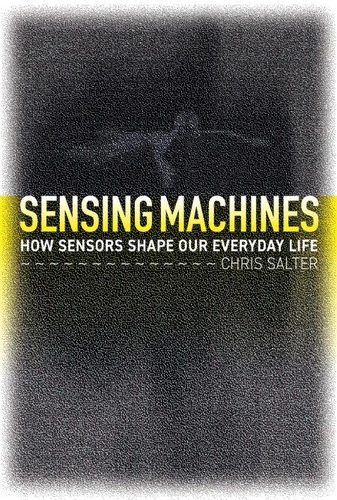Sensing Machines. How Sensors Shape Our Everyday Life
Par :Formats :
Disponible dans votre compte client Decitre ou Furet du Nord dès validation de votre commande. Le format ePub protégé est :
- Compatible avec une lecture sur My Vivlio (smartphone, tablette, ordinateur)
- Compatible avec une lecture sur liseuses Vivlio
- Pour les liseuses autres que Vivlio, vous devez utiliser le logiciel Adobe Digital Edition. Non compatible avec la lecture sur les liseuses Kindle, Remarkable et Sony
- Non compatible avec un achat hors France métropolitaine
 , qui est-ce ?
, qui est-ce ?Notre partenaire de plateforme de lecture numérique où vous retrouverez l'ensemble de vos ebooks gratuitement
Pour en savoir plus sur nos ebooks, consultez notre aide en ligne ici
- Nombre de pages328
- FormatePub
- ISBN978-0-262-36875-9
- EAN9780262368759
- Date de parution19/04/2022
- Protection num.Adobe DRM
- Taille2 Mo
- Infos supplémentairesepub
- ÉditeurThe MIT Press
Résumé
How we are tracked, surveilled, tantalized, and seduced by machines ranging from smart watches and Roombas to immersive art installations. Sensing machines are everywhere in our world. As we move through the day, electronic sensors and computers adjust our thermostats, guide our Roombas, count our steps, change the orientation of an image when we rotate our phones. There are more of these electronic devices in the world than there are people-in 2020, thirty to fifty billion of them (versus 7.8 billion people), with more than a trillion expected in the next decade.
In Sensing Machines, Chris Salter examines how we are tracked, surveilled, tantalized, and seduced by machines ranging from smart watches and mood trackers to massive immersive art installations. Salter, an artist/scholar who has worked with sensors and computers for more than twenty years, explains that the quantification of bodies, senses, and experience did not begin with the surveillance capitalism practiced by Facebook, Amazon, Netflix, and Google but can be traced back to mathematical and statistical techniques of the nineteenth century.
He describes the emergence of the "sensed self, " investigating how sensor technology has been deployed in music and gaming, programmable and immersive art environments, driving, and even eating, with e-tongues and e-noses that can taste and smell for us. Sensing technology turns our experience into data; but Salter's story isn't just about what these machines want from us, but what we want from them-new sensations, the thrill of the uncanny, and magic that will transport us from our daily grind.
In Sensing Machines, Chris Salter examines how we are tracked, surveilled, tantalized, and seduced by machines ranging from smart watches and mood trackers to massive immersive art installations. Salter, an artist/scholar who has worked with sensors and computers for more than twenty years, explains that the quantification of bodies, senses, and experience did not begin with the surveillance capitalism practiced by Facebook, Amazon, Netflix, and Google but can be traced back to mathematical and statistical techniques of the nineteenth century.
He describes the emergence of the "sensed self, " investigating how sensor technology has been deployed in music and gaming, programmable and immersive art environments, driving, and even eating, with e-tongues and e-noses that can taste and smell for us. Sensing technology turns our experience into data; but Salter's story isn't just about what these machines want from us, but what we want from them-new sensations, the thrill of the uncanny, and magic that will transport us from our daily grind.
How we are tracked, surveilled, tantalized, and seduced by machines ranging from smart watches and Roombas to immersive art installations. Sensing machines are everywhere in our world. As we move through the day, electronic sensors and computers adjust our thermostats, guide our Roombas, count our steps, change the orientation of an image when we rotate our phones. There are more of these electronic devices in the world than there are people-in 2020, thirty to fifty billion of them (versus 7.8 billion people), with more than a trillion expected in the next decade.
In Sensing Machines, Chris Salter examines how we are tracked, surveilled, tantalized, and seduced by machines ranging from smart watches and mood trackers to massive immersive art installations. Salter, an artist/scholar who has worked with sensors and computers for more than twenty years, explains that the quantification of bodies, senses, and experience did not begin with the surveillance capitalism practiced by Facebook, Amazon, Netflix, and Google but can be traced back to mathematical and statistical techniques of the nineteenth century.
He describes the emergence of the "sensed self, " investigating how sensor technology has been deployed in music and gaming, programmable and immersive art environments, driving, and even eating, with e-tongues and e-noses that can taste and smell for us. Sensing technology turns our experience into data; but Salter's story isn't just about what these machines want from us, but what we want from them-new sensations, the thrill of the uncanny, and magic that will transport us from our daily grind.
In Sensing Machines, Chris Salter examines how we are tracked, surveilled, tantalized, and seduced by machines ranging from smart watches and mood trackers to massive immersive art installations. Salter, an artist/scholar who has worked with sensors and computers for more than twenty years, explains that the quantification of bodies, senses, and experience did not begin with the surveillance capitalism practiced by Facebook, Amazon, Netflix, and Google but can be traced back to mathematical and statistical techniques of the nineteenth century.
He describes the emergence of the "sensed self, " investigating how sensor technology has been deployed in music and gaming, programmable and immersive art environments, driving, and even eating, with e-tongues and e-noses that can taste and smell for us. Sensing technology turns our experience into data; but Salter's story isn't just about what these machines want from us, but what we want from them-new sensations, the thrill of the uncanny, and magic that will transport us from our daily grind.



